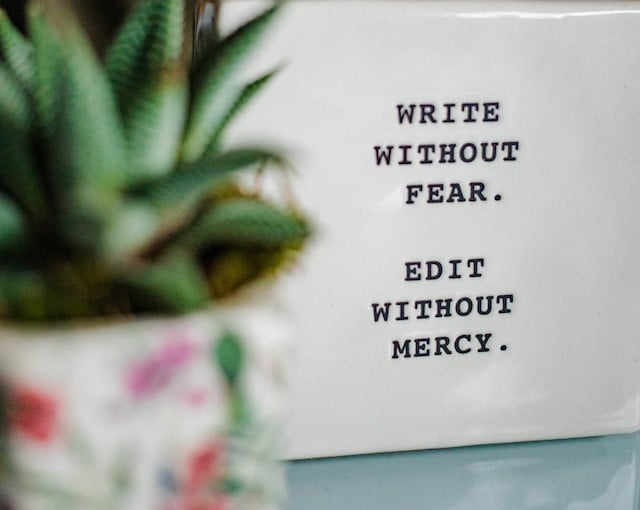Essentials
Podcasting Essentials
Related articles:
As an independent fiction podcast creator, you’re probably working on a tight budget. (If you have a budget at all, that is.) What money you have disappears quickly, and sometimes you have to sacrifice certain aspects of your planned production process. A professional script editor is often one of the first to go, if it was ever an option at all. You’ll have to rely on yourself to polish your script and get it to its final form.
However, this doesn’t mean that your script gets any leeway in quality. A weak script will absolutely destroy all your hard work. No matter how cool the sound design, how talented the cast, and how strong your marketing plan, a puffy, bland script will negatively impact your final product, your show’s reception, and potentially even your reputation as a creator.
Self-editing isn’t always ideal, but it is sometimes the only option. If you’ve never edited your own work before, here are some tips to get you started, all lovingly provided by a fellow broke creator with years of self-editing experience.
Take Your Time
When you are going to be your own editor, you need to give yourself enough time to do the job properly. Start early and plan ahead, leaving room for unexpected problems. That way, you have time to slowly go through your script multiple times. When you try to rush through in order to get your show moving on schedule, you could risk making things worse by missing details or typos, or making impulsive changes that negatively impact the quality of your script.
You should also plan for breaks throughout the writing process. This keeps it all fresh and helps you avoid becoming numb to your own writing. After a while, it’s easier to miss typos and continuity errors in your own work because your brain gets used to what it’s seeing and starts filling in the blanks and fixing typos on its own. In his 2000 craft book On Writing, Stephen King suggests putting your novel aside for six weeks before you begin to edit it. He’s strict about it. No going in to take a peek, no quickly adding something else. Six weeks resting in the drawer while you go off and do something else.
Obviously this exact method doesn’t work for everybody’s schedule or creative process, but you do need to take breaks. By scheduling in time away from your script, you’ll find that it’s easier to get through the self-editing process, and having enough time to get good results will actually provide those good results.
Know the Purpose of Every Scene
You need to make sure that every scene you have in your script serves a purpose. This DOES NOT mean “serves the plot”. Don’t come after me, I will not answer. Some scenes, or even full episodes, might be strictly about developing characters or setting, and that can significantly improve the quality of your podcast. However, you don’t want to bog down your story with too many unnecessary scenes. Too much exposition or too many unconnected scenes and episodes can get boring or overwhelming for an audience to keep track of.
As you go through your script, contemplate what purpose each distinct scene plays. Think about it as a single entity, as well as part of a whole. Does the scene make sense? Does it follow the theme and tone you’ve established? And most importantly: Is it interesting? By asking this question of each scene, you can trim things that might make your otherwise fun and exciting story bloated and dull.
I’m not saying “Kill your darlings.” I’m saying, maybe consider your darlings. If you adore a scene and just feel in your gut that it belongs, then keep it. You can also make some of the cut scenes bonus Patreon content or newsletter magnets, helping you bring in new listeners and create a stronger connection with your existing audience.
Develop Your Own Voice
Everybody is influenced by the world around them. As much as we might like to think that our work comes fully formed from our own genius, that genius is only part of the process. You can find inspiration, purposefully or subconsciously, in everything from a throwaway comment made by a family member to your favorite hundred books. These influences will often find their way into your work; this is natural and creates some really cool dialogue between stories, but you don’t want your podcast to be a carbon copy of your favorites. You might share some themes, general settings, or archetypes, but the last thing you want is for a listener to go, “this is a ripoff of X wildly popular podcast” and unsubscribe. Your audience, your cast and crew, and you yourself deserve better than that. By the time your script is done, your influences should be smoothly incorporated into a wholly original story.
As you go through your first draft, consider how you’re making the story your own. What is that spark that only you can bring to your story? As you self-edit, there are so many decisions to make and you’ll have advice coming at you from various angles (Hi there). Don’t go to the other extreme and edit so much that your own voice dissolves into something more “market friendly.”; just make sure that you aren't retelling the exact same story.
Stick the Landing
Eventually, you’re going to reach the end of your story. When you get there, don’t be afraid to stick the landing. You’ve put so much time, energy, and resources into creating your podcast, so give it the ending it deserves. Develop your ending based on what you’ve created and what you believe it should be, not what you’re afraid other people might like or dislike.
While your actual plans might change between the start of your series and the end, you should give the ending the same amount of care that you’ve given everything else. Don’t soften things up because you think fans might be mad about something bad happening to a character, or because other shows have done the same thing. Your listeners will know if you pull back at the very end. As you edit your ending, consider if this is the ending your story needs. If it is, excellent! If it isn’t, then take a break and consider what it is that is missing from the story’s conclusion. If you’re not sure how to do that, ask yourself these four questions:
- Do I like it?
- Does it comfortably connect with the rest of the story?
- In ten years, will I be proud of this ending?
- What is my gut saying about this ending?
That final question is both the most difficult and most important one to answer. I once wrote an ending that I liked and that tied in well with the rest of the story I’d spent years crafting. But even as I polished it dangerously close to the deadline, my gut told me that something was off. Two days of talking myself through new ideas on a transcription app as I did chores left me with a sparkling clean house and an ending that felt much better for the story I was telling. If you don’t take anything else from this article, I beg you to just listen to your gut. It’s not always easy, but it is always worth it.
Build a Process
If you’re going to do your own editing for multiple episodes or projects, you need to have a process in place. This will help you target every part of the script individually and avoid forgetting anything or making mistakes throughout. Do your edits the same way every time; what that way is will depend on you.
Below I’ve provided my own drafting and editing process should you want to use it as a template. While my fiction work is primarily in prose, this is the general approach I have used for everything, including my micro-fiction series, Dart.
Skeleton Draft
Get the bones in place, but don’t worry too much about the details yet.
Rough Draft
This can be hot garbage, but it should be hot garbage that sets the foundation for the good stuff.
Round 1 - Connective Tissue
The content itself can still suck at this point, but you want to make sure the overall storyline is cohesive. Major plot issues should be addressed now, but stray commas can be left alone.
Round 2 - Shape Up
By the end of this, it should start looking like what you envision. The major plot, timeline, and character decisions should be complete. Fix minor plot issues, sharpen your dialogue, and add or subtract details as needed based on your drafting style.
Round 3 - Clean Up
Get everything in shape. You’ll have an almost final draft at the end.
Round 4 - Polish
By this point it is just small cosmetic issues, but fixing them will bring your writing to the next level.
Finished Script
See why I mentioned the importance of breaks above? By the time you reach the Clean Up round of edits without taking breaks, you’ll be so numb to your writing that you won’t see that typo until the final script goes out to your cast. You will also likely need to repeat rounds as you produce in order to fix new issues you missed along the way. Setting up an achievable and healthy self-editing process will help you to move faster while still getting good, consistent results each time.
In an ideal world, everyone could afford to have a professional editor work with them on their audio fiction script. Alas, we’re not in that world and a whole lot of us have to rely on our own eyes and brains in order to complete our scripts. If you've never self-edited before, it can be overwhelming, but if you apply these tips to your process, you’ll find that it’s an effective way to get great results with no budget.

